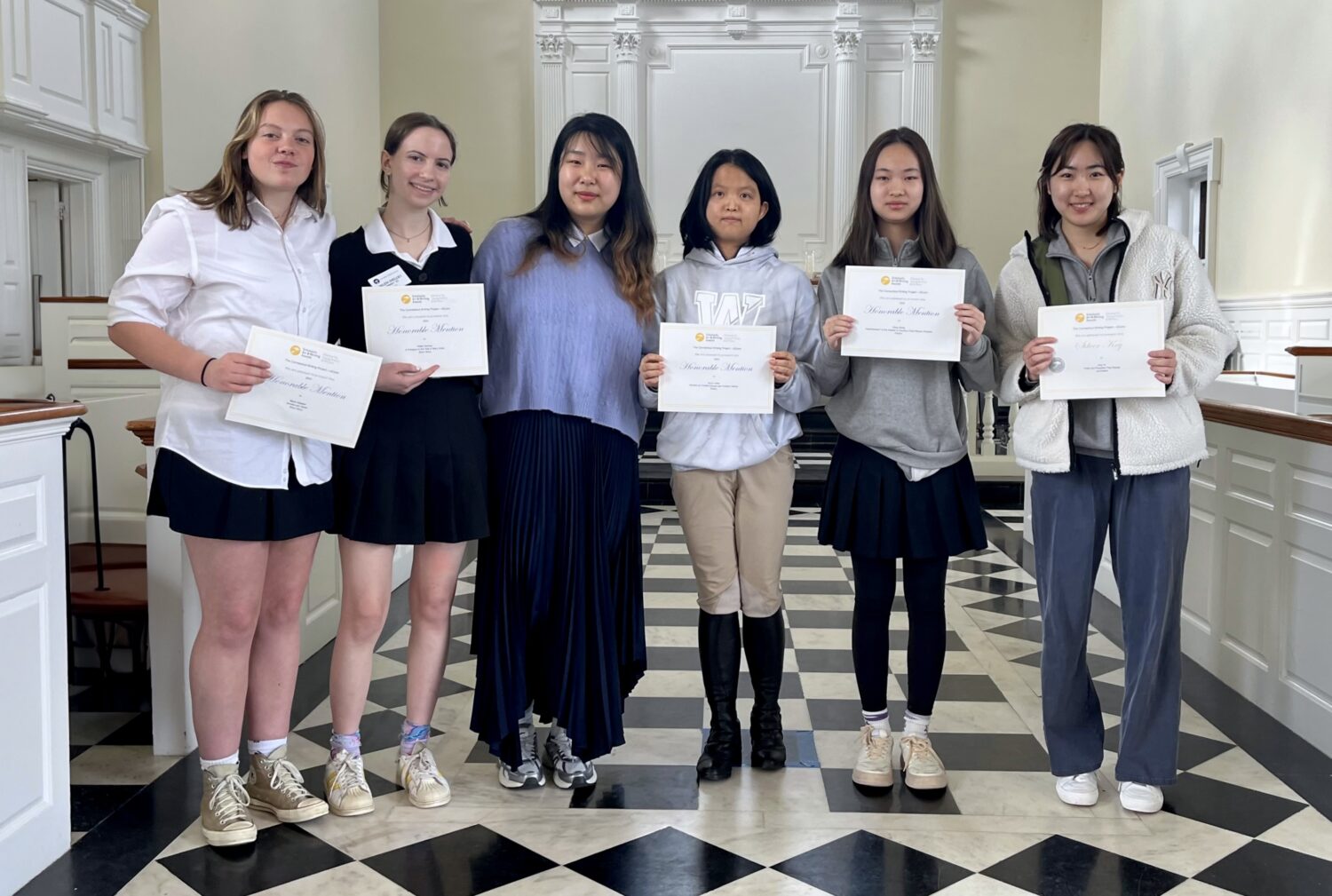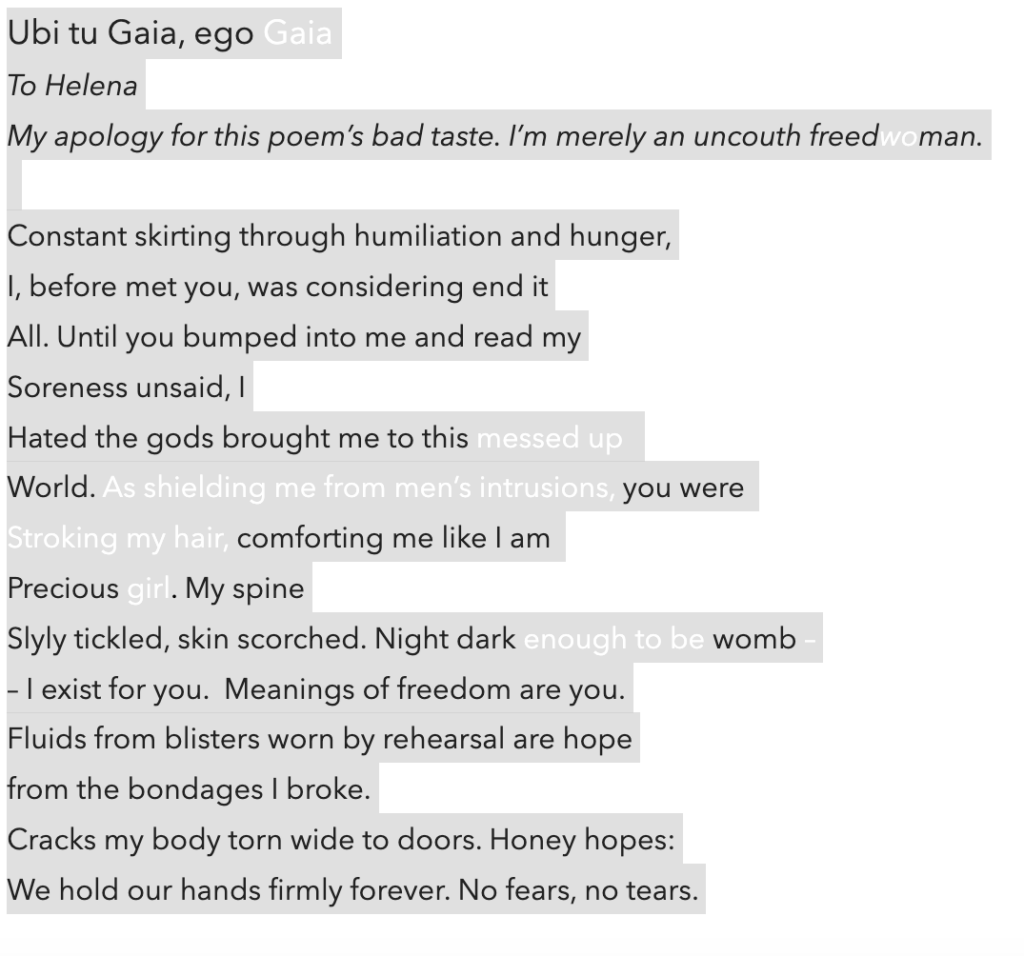
The work of six Walker’s writers has been selected for the Scholastic Art and Writing Awards. Nellie Kenney ’25, Marlo Meador ’25, Nancy Wang ’27, Rita Xiang ’24, Amy Yu ’25, and Julia Zhao ’24 received honors. This year, the Scholastic Art and Writing Awards expanded the number of categories for submission, and our students were recognized in each of those areas. We are proud to have such talented writers in our community!
Founded in 1923, the Scholastic Art and Writing Awards have inspired bold ideas in creative teens throughout the country for nearly a century.
Nellie Kenney ’25
A Prologue to the Trial of Mary Hicks
Honorable Mention, Short Story
Mary gives Betty her inkwell and pen, and the little girl draws great blotchy shapes: first on the walls, then on the rug, then on her own skin, then on her mother’s. She seems to like drawing butterflies best. Soon red admirals and holly blues and painted ladies trail up Mary’s arms. Nothing about them suggests species (each is made up of four wide black loops converging on an antenna-ed line), but Betty pronounces the type of each as she draws it.
Mary has torn out the pages of her notebook, and now she fixes them to every surface not hidden by boxes or covered in Betty’s drawings.
They talk. It’s mostly chatter. Mary tells Betty about how she once traveled all the way down to London, and how she stood on the new Howland Dock and watched sailboats bob up and down in the Thames. Betty tells Mary about the caterpillar she has raised in secret, which curls around a twig and a mallow leaf in her room downstairs.
Mary smashes the window with a paperweight, and golden breeze rustles the pinned-up pages. Betty leans out into the sunlight, and stretches her arms wide enough to encircle the sky.
Marlo Meador ’25
Smoke and Silver
Honorable Mention, Short Story
A mere 5 hours before, the desert had been an inviting, open expanse. It had beckoned the group of cattlemen forward with a dry palm open and up, and they had enjoyed the feeling of the sun beating down on their shoulders. Now, the desert was unforgiving. It seemed as though every little animal huddled in the orange dust lay still. Not a single noise could be heard, save the struggling sparks of the dying fire and the occasional stifled yawns of the men sleeping in a circle around it. They were all huddled on top of thin bedrolls, and few were successful in finding sleep’s warm embrace. Most of them clutched pistols to their chests as though the cold were a beast they could lasso, kill, and roast over the fire.
Kit lay horizontally and faced the flames, pitifully attempting to glean as much warmth from the embers as possible. From this angle, he could see the faces of the group around him. They were all morphed by flickering orange shadows. Their eyes appeared hollow, their brows grave, and if he let his imagination play, he could easily feel as though he were surrounded by the wendigos fabled to stalk the surrounding plains. His friends were suddenly pseudo-humans that preyed on the gullible nature of their prey. It looked as though they were waiting, jaws wide and drooling, for him to fall asleep. Kit’s mind often took over in the night, when the dust settled, the horses were tied, and he had nothing to do but think. Even in his sleep, he couldn’t truly rest.
Nancy Wang ’27
“Gentrification” Is the Answer to Society’s Poor-Person Problem
Humor, Honorable Mention
In modern Chinese society, the rise of economic stability has led to a huge change in people’s quality of life, but the divide in social classes continues to widen, creating a rather cumbersome problem. A large number of people are facing displacement, causing them to live in neighborhoods that are not ideal. The government used its economic windfalls to build new homes that poor people can not afford. The result? Many long term residents have had to move out from the hood to make way for more desirable residents.
Rita Xiang ’24
Blessing from the moon and the tides
Honorable Mention, Personal Essay & Memoir
This story soon became a little anecdote between the women in my family: two teenage girls trying to understand what “that time” means. However, every time the story was mentioned at the dinner table, Dolma and I would be the only two people who would not laugh. I felt confused and was wondering whether I did anything wrong, while Dolma, sitting next to me, bowed her head almost into her rice bowl. I held her hand secretly below the table, feeling that she seized my hand tightly. However, no one seemed to notice her, except for me — or they simply didn’t regard Dolma’s childish embarrassment as something important. Her reaction might just add more chips to the town talk, further entertaining them.
But what made me remember this was the way she told her conclusion to me: She said it in a soft voice beside my ear, secretly but boastfully, with her hoodie half lifted up. As if menstruation was a hidden treasure that one should be proud of but should remain silent of. I thought again of menstruation shame: I remembered how she hid the pads carefully in her hand every time she went to the bathroom; how she held my hand below the table; how she quietly observed her body in the mirror, and how she bowed her head almost into her rice bowl. I finally thought of the debate: when I stood behind the podium and argued the opposition for ignoring women’s needs, I hoped eagerly that Dolma would be in the same room. I would look into her eyes, and our hands would hold together as a huge net made by waves of tides.
Amy Yu ’25
Pride and Prejudice Play Review
Silver Key, Journalism
One would imagine themselves entering a Pride and Prejudice play, enjoying the elegant dances of the gentlemen and gentlewomen, but end up in a Disco room where Jane Bennet is twerking in front of the audience. Welcome to the Pride and Prejudice: Kate Hamill version.
A Perfect Match: Partner Compatibility in the Pride and Prejudice Literature
Honorable Mention, Critical Essay
In general, one would assume that material wealth and SES indicate marriage compatibility, as material possessions indicate one’s life experiences and values. However, this explanation fails to provide a holistic understanding of the rationale behind successful marriages; that is, genuine partner compatibility depends on the intention of marriage, regardless of one’s upbringing and SES. Therefore, this paper examines the effect of the matching intention in determining the viability of a romantic relationship through Pride and Prejudice and its remixes created over time with similar romantic plots but under various social settings.
Julia Zhao ’24
Archive on Fonteia Eleusis and Fonteia Helena
Honorable Mention, Poetry
Julia’s poem contains hidden words. The text has been highlighted here to reveal them.
